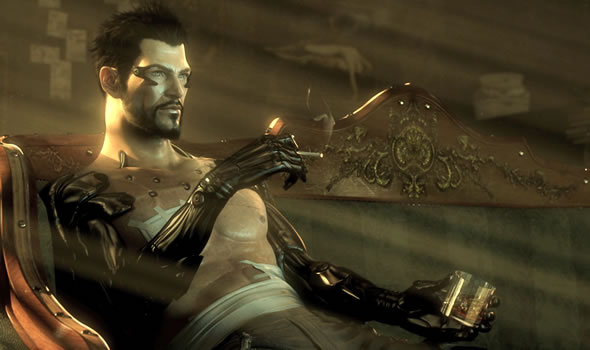
Involuntary muscle spasms. That’s about the best way one might describe this game. The sheen of freshly polished polygons and moody, murky tones feel displaced with interactivity focused on running to the giant X on the treasure map. Sadly, the treasure’s always just a clue to get to the next piece, like a certain bad movie’s namesake plot device. Deus Ex Human Revolution is utterly beautiful, and slightly off-kilter, but the intentionality of never feeling quite in place is questionable. Why does feeling so empowered reduce so much of the aesthetic, and while offering so much to explore, leave such a vague impression?
It seems to me that throughout your machinist exploration of the world itself, there’s a point where monotony becomes a key that ushers the rest of the plot forward. There’s less to do in each space, the space shrinks until it wraps itself around you, at which point an expansion occurs, but only enough to provide breath. The environments can definitely be described as choking, yet that’s actually to their credit, as so few games can really imitate urban sprawl and urban decay so exquisitely, perhaps because here we see it both from above and from below.
And in a sense, Deus Ex is about posing questions about decay, though perhaps more moral than physical, particularly when the character you embody is unabashed in his amorality. Morality is a funny question to consider in a videogame; what is moral in a videogame is amoral in reality, yet posing the question inside a virtual shell yields wild results. There’s no one in the vacuum of the game world to honestly consider the legitimacy or illegitimacy of any given choice, a decision is better described here as a programmed consequence. A program can’t “honestly say.”
Even in the virtual microcosm, to a certain degree, there are bits of truth in Jensen’s various quips, and each of them tell a story more of the road than the destination, the thousand miles traveled and the debate over whether all that exercise was worth it. The answer given is often uncertain, but perhaps in a game awash with characters whose motives are so explicitly self-indulgent, a bit of leniency towards the nature of man and the aspiring hope is not unwarranted.
Would I recommend this game? I’m uncertain. I’m uncertain because there are pieces of it I’d like to purge from my memory, purge from design altogether, and never see or hear a word from again. But there’s something here, something trying to work its way through all the muck plaguing every big-budget title these days that I want to give a gold star to a game moving in a direction, even if that direction may not always be forward. In some sense, Deus Ex attempts to do that. It moves, and we are moved. Despite such movement, I’m not sure I can laud the possibility of progress when games like Child of Eden make actual strides in interactivity.